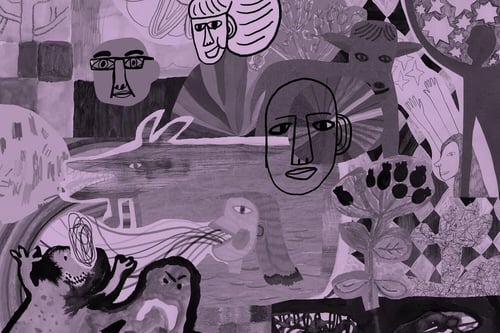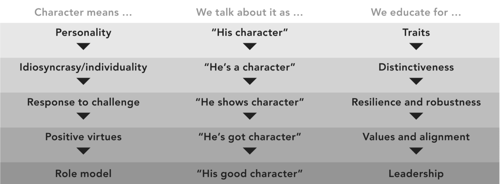The Way | Learn | The Purpose of Teachers
The Things We Call Character
The things we call ‘character’ come not from a single voice but from the voices of many. We believe that definitions of both character and character competency should be deliberately designed to be inclusive, allowing for as many as possible to situate their beliefs within a broad community of practice. In other words, while there may be some common ground on what character may or may not be, it is up to individual communities and their members to identify those specific words that genuinely speak to them and, therefore, have most meaning in the process of education of their children. Communities may choose to adopt a particular framework of ideas that they import into this vocabulary, but they do not need to do this, per se. Character comes from within the heart of a community in our contemporary world; it must be modelled and exemplified by leaders, but it is not handed down from on high.

Early on in our work with schools, we uncovered a correlation between the manner in which educators in particular and school community members more generally position the concept of character and how they then engage with it in their work of education. We wanted to ask key questions of the educators: Does how much we frame character influence what we expect of a person? How we might measure it? How we might educate for it? Increasingly we saw that the responses of teachers to questions such as these were shaped by their affinity towards the very word ‘character’. The more educators seemed to believe in the notion of character, the more their perspectives seemed to lean into practice that embraced the centrality of character within their fundamental educational objectives.
The range of perspectives offered might be best understood on a sliding scale that speaks to both the individual’s sense of the importance of character and also the impact of this on the vocation of the school in which these perspectives are housed.

What is this thing called character The influence of teacher perspectives about character on character education
We can see from this that the more invested a person is in the relative merit of character as a concept, the more it will be regarded as being of importance in the whole purpose and process of education. There is, therefore, a putative taxonomy that is both progressive and iterative with respect to disposition towards character education.
It is at the point of the middle of this taxonomy that we started to see an initial baseline for a shared language around character education and its purpose – we position students in situations or experiences of adversity (challenge) so that they might persevere (through resilience) and become strong (displaying robustness). Most educators we spoke to felt comfortable around this type of premise and it became, in our minds, almost a conventional wisdom of the profession, or perhaps a core disposition with which most could agree. From there, practitioners might also extend their thinking to take into account the positive impact of a values-based approach to character education and the resulting outcomes for the students. The most well-disposed thinkers tended to focus their work on the field of leadership, in particular, believing that the highest form of character could be seen in the expression of a form of servant leadership, necessitating, as it does, sublimation of individual desire to the collective solution to shared needs and the extra effort required on the part of the leader to secure this.
Character refers to how people live their lives in terms of their sense of belonging to their civic institutions, their potential, and their fundamental beliefs about what is good and right for them to do.
There were relatively few who conversationally referred to character without affection as “personality” or perhaps with bemusement of “idiosyncrasy”. When pushed further through conversation, most revealed a commitment to education which tended towards support for the mastery of competencies that might make up what we might call ‘character’. In other words, those who did not wish to commit to the term ‘character’ still were likely to support and even advocate for its constituent competencies. It seemed as though, however, that it was the term ‘character’ itself that was subject to a less favourable disposition. Reasons provided for this included a perception that ‘character’ might have been inherently gendered and biased in favour of a patriarchal view of education. Others saw the word as antiquated. Conversely, some saw it as a faddish thing that might come and go in educational parlance. More commonly, sceptics of the term revealed an inherent mistrust of a corporate definition of character, preferring an individually derived perspective, one that typically was cautious about the need or desirability of definitions that might be reductionist or conformist in nature.
This taxonomy of thinking led us in due course to embrace the definition of character that we revealed in the introduction. Character refers to how people live their lives in terms of their sense of belonging to their civic institutions, their potential, and their fundamental beliefs about what is good and right for them to do. It is seen by stakeholders in school as a multi-layered idea that refers to the mark and measure of people, a notion that encompasses their characteristics and idiosyncrasies, the extent of their resilience and robustness, and their capacity to model and lead through their virtues and qualities. This character is the result of processes that help people to realise their own character while also replicating the character expected of them by others in terms of their civic obligations, performance standards, and moral challenges.
This definition allows for breadth in thinking and practice about the characteristics and idiosyncrasies or people, the extent of their resilience and robustness, and their capacity to model and lead through their virtues and qualities, as well as acceptance of the duality of character as a product of process of both realisation and replication. It also aligned with our understanding of the concept of character competency, which speaks to the essential knowledge, skills, character, and learning habits of students in identifying their mark and measure as people and how they live their life, especially in respect of their sense of belonging to their civic institutions (civic character), the fulfilment of their potential (performance character), and their fundamental beliefs about what is good and right for them to do with their lives (moral character).






